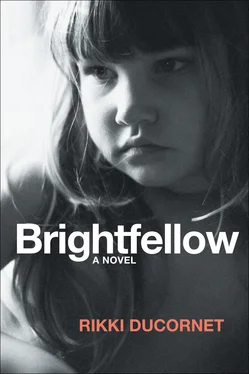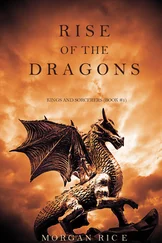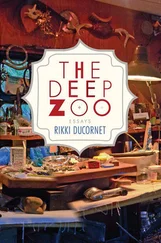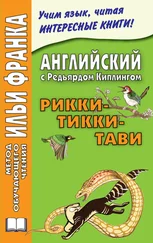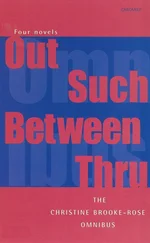“I’m here,” she breathes. “Are we all ready for eggs? Shall I make a move to move? Or. . maybe in a little while. .”
Out at sea a large ship approaches. He’s sold his rum for beef, wheat flour; a French baker is onboard, too! A fat Flemish blond. Or Swiss, to milk the cows. To be worth its salt a mousse needs a dollop of whipped cream. Sacks of Italian polenta, Indonesian rice, and bottled mincemeat (where the devil is mincemeat bottled? Wales?).
Oysters. He sends Ruby, her petticoats flashing, down the path to the beach to greet the oystercatchers, the boys who bring in mussels, too. Clams! Abalone. Sweet abalone!
“Sweet abalone. .,” he says aloud, almost singing.
“Who’s that?” Goldie wonders. “Rod? Are you seeing someone?”
And scallops. The sea appears to boil there are so many scallops. Lobster! And eel. ., “Sapphire!” he calls out. “Fish stew!”
“Fiddies don’t stew,” says Goldie. “They fwim.”
How wonderful it is in Jamaica. Far in the distance, far out to sea, he hears Goldie’s Rod say dreamily:
“Say, Goldie. How’re you set for bacon?”
“Bacon?” says Goldie. “Wha’s that?”

“Who are you?” Pea Pod asks Stub. She’s wandering around with a can of cashews, its top peeled back and sharp as a razor. “Why are you sitting on my daddy’s grass?”
“I’m from abroad,” Stub tells her. “In my country there’s no private property. I apologize. Say! Look at this. .” He pulls a toy gyroscope from his pocket.
“What does it do?” Pea Pod eyeballs the thing, intrigued.
“Let me show you.”

Later, stretched out on the sumptuous Boethius sleeping bag he stole from the Sandor Methinks dorms — the classiest on campus — he ponders the nature of his difficulty. What was his difficulty, exactly? Why was it that as far back as he could recall, he had never inhabited his own skin, had always been an outsider to everyone, even himself? Trees he could speak to, relate to — and in this way he was very like a child. Yet this, he thinks, must be, is a good thing because children are good. Even little Pea Pod with her temper and pinched face is good ! Yes, he is certain of this, recollecting his own brief moment in the garden when he did fit in his own skin and was good, was happy. If one could — despite all that transpires to undo the infant’s marvelous capacity for joy — continue to live, at one’s core, the life of the child, well then one would never cease to radiate out in all directions! As if. . as if. . as if one’s own navel were a sun! A blazing star, forever burning!
Things. He has few. The Boethius sleeping bag, a Swiss Army knife, a duffel (another Boethius, olive green, studded with real brass) that holds his limited, if acceptable, wardrobe. He has toothbrushes, toothpaste, secreted under sinks all over the place — the library, gym, kitchens, Utilities House, cabin in the woods — and there’s a small box of his stuff (galoshes, talcum powder) under the Provost’s porch.
The things belonging to others he considers as objects featured in a vanitas, made of clay, plastic, wood, glass, metal, and so forth; sometimes he comes upon a small thing of jade or cinnabar or lacquer, and in the penumbra of evening, the dawn light of early fall, the sweaty heat of August, takes it up gently and turns it this way and that as if looking at something from another world. He looks at other people’s dining room tables, their bed boards and fire tongs. Once, he stood outside a window gazing at Dr. Ash’s glass of port forgotten on a coffee table, radiating light. Sometimes he gets lost in the spine of a book, a bottle of milk, a scarf of yellow silk.
Yet he is not the only madman about! After all, there is Professor Brunelleschi, mad with pain, speaking to his wife sometimes for over an hour in the evening: Amore. My eye. The eye of my heart, my beloved, my violet button, my tangible rainbow, my exuberance, my youth, my tongue! Noni! I have forgotten how to laugh. I drink tears in the evening’s soup! I piss tears! Without you I become stranger by the day. I swim in my pants. . And in all the houses, the little radios, now pierced with windows the colors of looming bad weather, percolating with a senator named Ratmutterer: Rabble-rousers! Brooding eggheads! They cook their pernicious rumors in pink, pink casseroles made by Soviets reeking of unwashed —
Stub covers his ears. Runs to the library. It’s a good place, the library. One is left to oneself. It is like you are a tree or a receptacle for cans. Once a professor asked me my major. I was reading beneath the bull’s-eye window in Sciences. Science, I said. He asked why. I thought about it. Then I said: I enjoy knowing why things move. Nothing ever stands still. Things are always rising and falling, growing and shrinking. I began to feel an old fear rising and couldn’t go on. He said: I know exactly what you mean. It’s exhausting. And he wandered off chuckling.
But today. Someone — a Professor Emeritus, I think he said he was — named William Sweetbriar, “Billy,” introduced himself. And when he asked I told him my best lie: I was on a Fulbright from New South Wales, Australia. And I was working on the Vanderloon papers. I got carried away. I hadn’t actually talked to anybody for over six months and suddenly I was a chatterbox!
“All the way from New South Wales to study Loon!” he cried out. “I know Loon, of course. Knew him. As well as he allowed. We were colleagues, of course. And his library! Of course you have access to the library!”
“Well, it’s in boxes, sir. Not yet inventoried. .,” I said, the merest hint of an Australian accent now coloring my speech. And then he asked me the question I feared.
“You’re working with Harvey? Old Pemble?” He snickered and winked, sharing an obscure joke.
“No.” I smiled as best I could. “The, the new. . he’s visiting, from. . Oxford: Welch. He’s here briefly, I gather. Filling in for. .”
“Pemble! Of course! I’d forgotten he’s abroad. I’m out of touch.” Billy sighed. “With the department I mean. You hit a certain age you’re so busy oiling your joints and calming your rashes, your stomach gasses — you’ve no time for much else. What’s your name, son?” And I said, and I have no idea why I said this, but I said:
“My name is Charter Chase.”
“ Entre nous, Charter,” Billy whispered fiercely, “You’re lucky Old Pemble is abroad. Well, I’m off! But. .” He looked deeply into my eyes as if reading me and said: “But I should make you dinner, lonely scholar that I suppose you are.”

A can is kicked, he sees it rise above the dust and for an instant catch fire in the light of the moon. Asthma is “it.” She stands with her foot on the can in triumph as the others return to the Circle. She closes her marvelous eyes and begins to count. If Vanderloon could see her, he would say that Asthma is currently the “superior principle.” She plays the part of the bird; the others play the fish. And the bird always catches the fish. It is never the other way around.
Somewhere hidden among the darkest of cosmic star houses, Pea Pod weeps. Her tears are just another thread in the fabric of time. Time — that obstinate, irascible persona non grata, a finger in every pie. He looks at the can. There it is, casting a shadow, like a dolmen for an ant. Right at the center of everything.
Читать дальше
